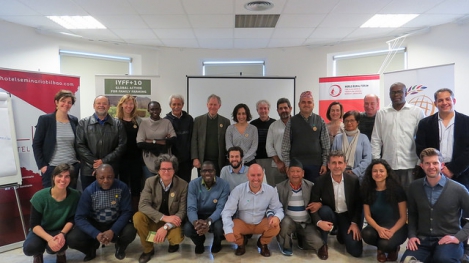Within the context of building a Collective Action, representatives of family farming organisations, universities and research centres, the European Union and the German Ministry of Agriculture, actively participated in a workshop co-organised by the WRF and GFAR
Tuesday, 10 April.- Regional Family Farming organisations from Africa (PROPAC), America (COPROFAM), Asia (AFA) and the Pacific Islands (PIFON), together with a national organisation from Senegal (CNCR), shared and discussed the conceptualisation and process of Participatory Agricultural Research. One of the organisations’ main demands was the need to highlight the importance of carrying out Participatory Research based on the needs of Family Farming itself, where the focus of the research is the subjects, that is, family farmers.
The WRF and other associated entities of GFAR (Global Forum for Agricultural Research), worked, on 20 and 21 February, on designing a Collective Action to allow family farmers to promote agricultural Research entitled “Improving participatory processes among farmers and family farmers, civil society/rural communities and research and innovation centres”. It should be noted that this initiative is driven by the WRF and COPROFAM, current members of the GFAR Steering Committee.
Representatives from family farming organisations such as AFA, Coprofam, PIFON, CNCR and Propac, universities and research centres such as Cirad, ISRA BAME and University of Louvain, as well as representatives of the European Union and the German Ministry of Agriculture, participated actively in this workshop co-organised by the WRF and GFAR.
The overall aim of the Collective Action is to contribute to transforming the current model of agricultural research governance to develop alternative systems of agricultural research and innovation in which governance is inclusive and allows the development of research and innovation processes in which the farmers and rural communities themselves are active, recognised and valued actors.
Family Farming Organisations stressed that Agricultural Research should promote models of sustainability in Family Farming, in the face of merely productivist views that do not value its social and environmental dimensions. It is necessary, therefore, to focus research and budgets on improving Family Farming, and for this it is important to influence the decision-making agendas and public research policies.
These seminars laid the foundations for a collaboration between the different agents through a working group around building a collective action, which seeks to be a learning space based on experience and promotion that generates changes in the governance of agricultural systems, recognises the knowledge of Family Farming and makes it possible, therefore, for family farmers to be the drivers in their own development.
PARTICIPATORY RESEARCH IN THE DECADE OF FAMILY FARMING
Participatory research is one of the three areas of work of the IYFF +10/Decade of Family Farming, and seeks to encourage and promote the link between the agricultural research sector and Family Farming organisations, which also includes the processes of social innovation.
Family Farming needs research to improve the way of life for family farmers, just as research needs farmers in order to carry out its work. Family Farming must maintain its identity at the same time as innovating, and adapt with the aim of increasing sustainability and the well-being of the families involved.
The Participatory Research line of work of the IYFF +10/Decade of Family Farming is, therefore, a tool to ensure that agricultural research focuses mainly on developing Family Farming, offering tools from a broader approach and with a integrative vision based on the three pillars of sustainability: social, economic and environmental. It will also help research centres develop their work with a better connection to family farming organisations.
The effective connection can be produced by encouraging regular meetings between the two sectors and joint participation in events, co-development of research projects, knowledge exchange, among many other activities.
More information:
- PARTICIPATORY RESEARCH: CONNECTING FAMILY FARMING ORGANISATIONS AND AGRICULTURAL RESEARCH CENTRES
- Together is Better – Designing a Collective Action to make research Participatory and Accountable https://blog.gfar.net/2018/02/28/together-is-better-designing-a-collective-action-to-make-research-participatory-and-accountable/



